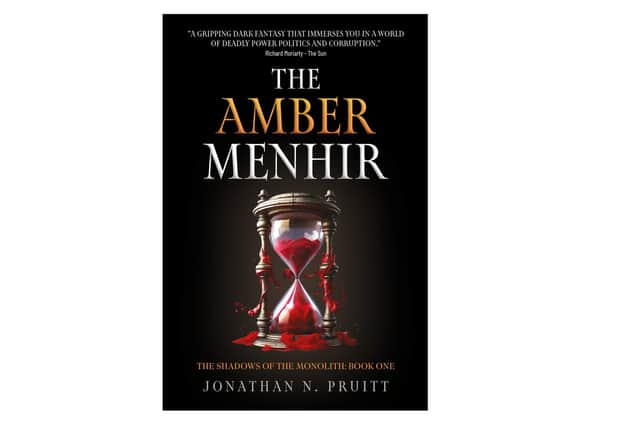New work of fantasy fiction: Read this review of a novel with a dark and sinister plot


For those who love their fantasy worlds dark and sinister, The Amber Menhir by Jonathan N. Pruitt should be your next destination.
Only metaphorically, however, because the titular towering monolith and bastion of magical powers is, as we learn over the course this deliciously ominous story, not the safest of locations to hang out for any length of time.
In fact, it is such a hotbed of murderous ambitions and dangerous political scheming that it makes a pit of vipers look like a basket of kittens.


And it is exactly where the three young protagonists of the novel are heading at the story’s start.
Each hailing from a noble bloodline, the trio are among the yearly intake of ‘ascendents’ — students who enter the Amber Menhir to prove their thaumaturgical gifts, and themselves worthy of joining the ranks of the scholars within.
To gain entry is prestige defined, for the menhirs scattered around the unnamed world of our story are leading the fight against Armageddon.
Indeed, these ancient magical research institutions were created expressly to bring together the most brilliant and powerful in a bid to protect the planet from certain destruction in the millennia to come, when its orbit enters a mysterious nebula known only as ‘Calamity’.


To those on the outside, they are respected centres of learning, populated by six noble factions of magic working harmoniously towards the shared goal of salvation.
These comprise the Weavers of the Web, who manipulate life energy; the Architects of Forces, who control the forces of physics; the Sounders of Echoes, who defuse thaumaturgical problems; the Evaders of Death, healers who work to unlock the keys of immortality; the Delvers of the Mind, who decode the mental realm; and the Tilters of the Hourglass, the rarest of the thaumaturgical powers, with the ability to manipulate time.
But as ascendants Tara Langcraw, Peony Bianchi, and Roland Ward soon come to find, the six factions — of which they are each expected to align with one, based on their own magical aptitudes — deride and despise each other, believing their own cabal to be superior in every respect.
On the basis of her lineage, Tara has been tipped to join the Tilters of the Hourglass and enters the Amber Menhir with high expectations and a haughty and frosty manner to match.


This is in stark contrast to straight-talking Peony Bianchi, whose natural amiability quickly builds a friendship between the two before Tara has time to object.
Initially, Tara thinks the seemingly slow-witted Roland Ward, who attaches himself to her and Peony from the off, an irritation, but his unaffected manner and puppy-dog loyalty eventually wins her round.
And over the coming months, they will all come to be thankful for these friendships in ways they could never imagine upon their enrolment.
For the menhirs run on the strict principle of unquestioning conformity, which Tara and Peony — and Roland, in solidarity with his friends — have great difficulties with.
Her much-mooted magical powers may be worryingly late in manifesting, which could mean a humiliating expulsion at the end of the first year, but Tara Langcraw has an exceptionally inquisitive mind.
This leads her to ask awkward questions which only serve to get her tutors’ backs up, especially when it becomes clear that Peony has not just one thaumaturgical power but two — something which, doctrine dictates, is not possible.
The situation does not go unnoticed by the factions within the menhir, particularly by the head of the Weavers of the Web, Primogen Okondo, who begins to groom Peony for her own political ends.
Meanwhile, a servant named Chesa — a lay citizen — is also causing disruption within the menhir, having murdered the head of the Delvers of the Mind and setting off a power struggle that threatens to explode.
She was, however, only following orders, though not from any of the factions. This battleground in the making has numerous players, each with their own shadowy and incompatible objectives.
As the tension ramps up, it becomes ever-more challenging to determine who can be trusted and who is ready to strike the proverbial knife between the shoulder blades.
Only one thing is certain: the status quo is being rocked violently and the disappearance of certain files that could help point towards meaningful answers suggests that certain bad actors like it that way.
Tara, Peony, and Roland will prove pivotal in the crisis to come, that is if they can survive long enough.
The Amber Menhir is an incredible ride, part rollercoaster of twists, turns and rapidly reversing fortunes; part ghost train of macabre delights.
With the academic setting and three young student heroes, you could perhaps draw a parallel to Hogwarts, but only if the Harry Potter series had been produced by Hammer Films or penned by Stephen King.
And with the naked political machinations, perhaps House of Cards (House of Tarot Cards?) might fit for a comparison.
There are some (more cerebral) critics who have compared The Amber Menhir to the writing of Ayn Rand, whose instruction to see reality as it really is beneath the dogmatic sheen certainly applies.
However you take it, though, you’ll find yourself engrossed from the off, with debut author Jonathan N. Pruitt throwing the reader right into the middle of an assassination before we’re even 10 pages in.
It only gets more brutal from there, with students and scholars alike being in the firing line if needs be.
The jeopardy of the novel’s spectacular finale will stun and mesmerise, as the veils are finally lifted and the claws are most definitely out.
Speaking of claws, mention must be made of the maus, ferocious twin-tailed feline beasts that are faithful companion and lethal bodyguard all in one.
They’re certainly not alone in prowling the hallways but they are, in terms of immediate sensation, perhaps the most unnerving.
Tara’s journey across the intricately plotted and layered narrative is analogous to the reader’s experience.
Near immortal, barring accidents, Tara starts out confidently, cocksure that “My bloodline is strong. I will develop the same aptitudes as my mother… grandmother. It is why I am here.”
In the early part of The Amber Menhir you may think you have a handle on where things are going, but then something happens that erodes this confidence, just as Tara starts to doubt herself when her magical powers show no sign of announcing themselves.
It is then, as events begin to spiral and she cannot defend herself against even the most minor of thaumaturgy, that her mother’s warning to keep an eye on every scholar and ascendant really hits home.
You’ll most likely feel the same, wondering just what on earth is going to happen next and finding yourself questioning whether the characters you have grown to root for will actually make it to the final curtain.
For nothing is certain, and even the greatest Tilter of the Hourglass can only influence time in a measure of moments.
While The Amber Menhir is first and foremost escapist entertainment, there is a sharply satirical edge to it, commenting on the political powerplay and corruption to be found beneath the surface of even the most revered institutions.
The scholars of the menhir are marked by rampant self-interest, greed, and a willingness to exploit, be it their peers or the wider, non-magical laypeople who they supress and live off almost vampirically.
Tara is exposed to this while staying temporarily in one of the few independent cities of the realm, where she encounters a broken ruin of a man who accuses the menhirs of stealing lives and minds.
The next day, there is no trace left of the wretch, with a hovel almost certainly being his home having been burnt to a cinder.
Perhaps most shockingly, though, the scholars have no qualms about locking up and experimenting upon unfortunates who possess thaumaturgical abilities that deviate from the norm.
Their argument that it benefits the greater cause, beating Calamity, does not seem so worthy when, later on in the novel, we get to visit the pens of these poor ‘anomalies’.
Planned as the first of five books, The Amber Menhir is a triumphant debut, written in beautifully polished, pithy, and vivid prose.
Take, for example, such well-manicured and evocative language as “A tumbling pool of shadow where no such shadow should exist writhed”, or “The figure vanished, sliding back into the corner of the room like black water through an unseen crack.”
The characters, too, are a major selling point of the book, and refreshingly turn traditional fantasy tropes on their head with players of differing ethnicities, sexualities, and age, from the mahogany-skinned Peony to the matronly Mrs Ash.
They walk around foreboding settings with just as much character. I particularly enjoyed the primordial Weaver forest, which Tardis-like fits inside Primogen Okondo’s office with its indefinable climate and trees.
In future instalments of The Shadows of the Monolith series we will get to discover the other menhirs, as well as learn about the bigger picture concerning Calamity, and I for one can’t wait.
For Pruitt has set up a fantastic land of dark imaginings ripe for exploration, and himself for a very promising literary future.
The Amber Menhir (Book One of The Shadows of the Monolith) by Jonathan N. Pruitt is out now on Amazon in paperback, hardcover, and eBook formats, published through Spinner Loom Press and priced £15.34, £28.58, and £9.99 respectively. For more information, visit TheShadowsoftheMonolith.com or follow the author on Instagram.